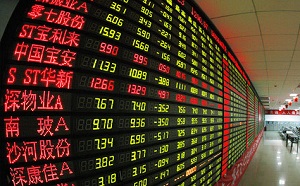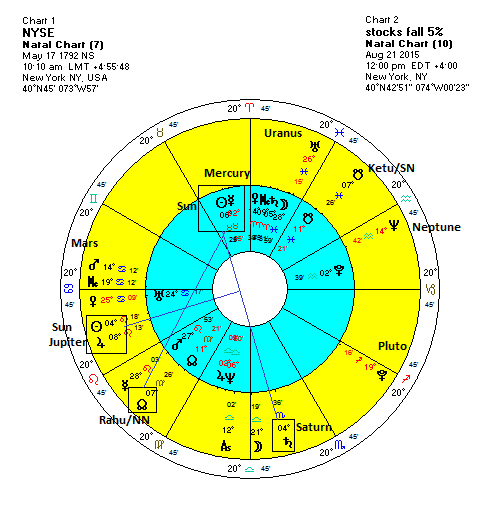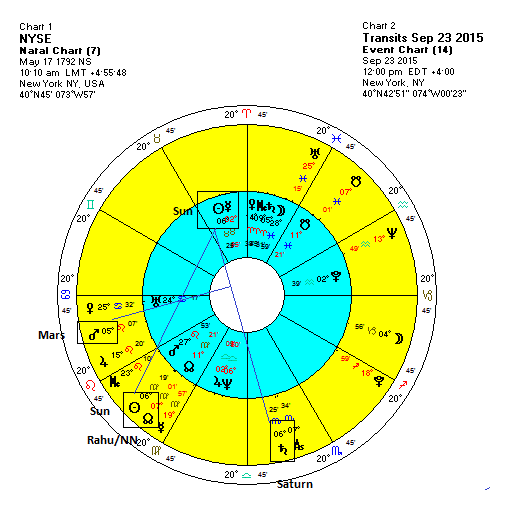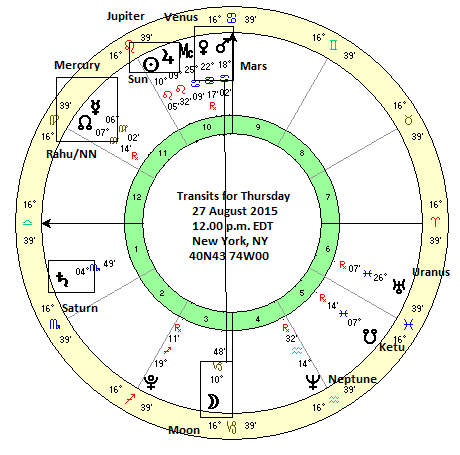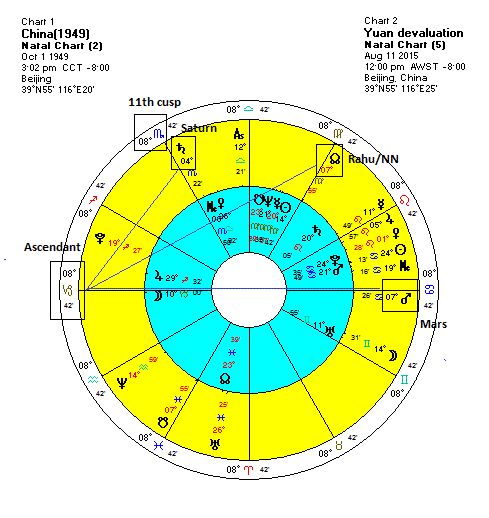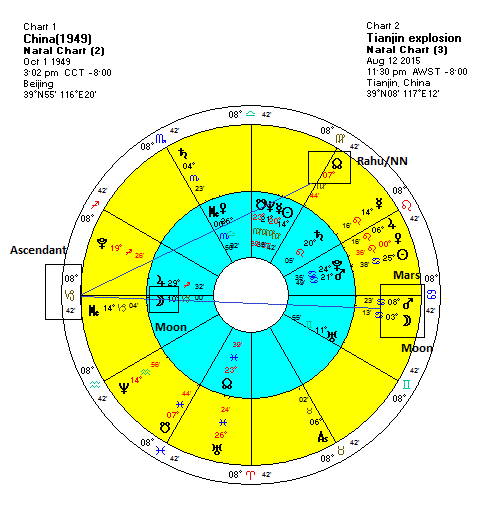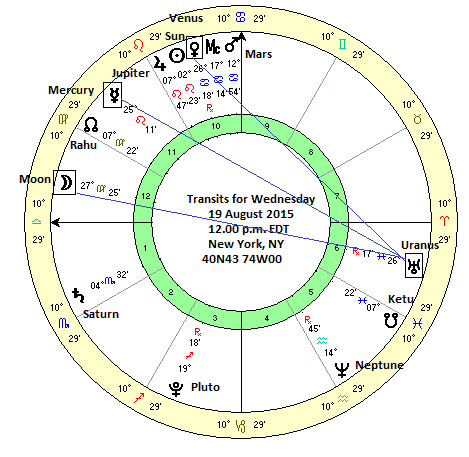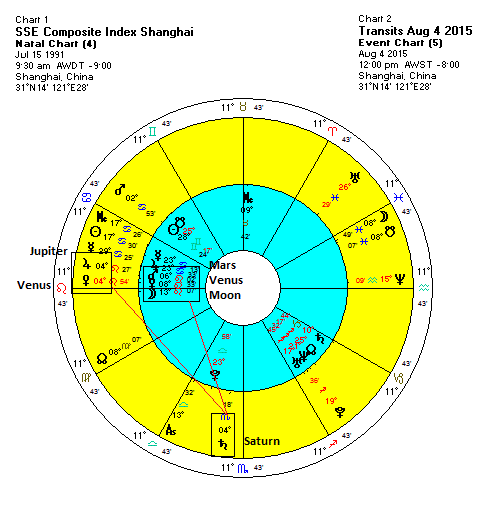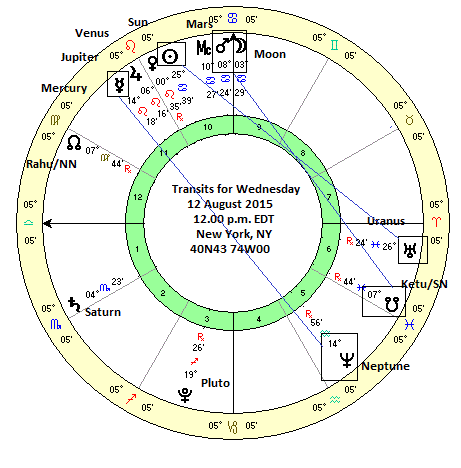 (31 August 2015)
Stock markets recovered last week after Monday's scary plunge. The
Chinese government intervened in the markets once again and this time it
actually seemed to work as the interest rate cut and looser bank
capital requirements restored business confidence. The Dow briefly fell
below 16,000 early in the week and ended at 16,540. India's BSE-Sensex
traded below 26,000 for the first time since summer 2014 and finished
at 26,283. In last week's financial forecast, I suggested some
possibility of a midweek recovery on the Sun-Jupiter conjunction. This
appeared to broadly coincide with the rebound after Monday's decline.
But I had been fairly skeptical about the week overall given the
Mercury-Rahu influence and its possible connection with Saturn. In
other words, stocks ended somewhat stronger than I had expected.
(31 August 2015)
Stock markets recovered last week after Monday's scary plunge. The
Chinese government intervened in the markets once again and this time it
actually seemed to work as the interest rate cut and looser bank
capital requirements restored business confidence. The Dow briefly fell
below 16,000 early in the week and ended at 16,540. India's BSE-Sensex
traded below 26,000 for the first time since summer 2014 and finished
at 26,283. In last week's financial forecast, I suggested some
possibility of a midweek recovery on the Sun-Jupiter conjunction. This
appeared to broadly coincide with the rebound after Monday's decline.
But I had been fairly skeptical about the week overall given the
Mercury-Rahu influence and its possible connection with Saturn. In
other words, stocks ended somewhat stronger than I had expected. So is the worst over? I doubt it. The strong Saturn influence is still going to shape investor sentiment in the weeks to come. This is likely to translate into more market volatility at least through September and possibly October when Saturn aligns most closely with Ketu (South Lunar Node). These general trends in stocks can also be seen through the horoscope of the major indexes. The horoscope of the German Stock Exchange Index, the DAX, (launched 1 July 1988) reflects the broad trends in both European and global stocks this year.
The DAX hit its high in the spring when Jupiter was in alignment with Uranus. Most importantly, this favourable aspect activated the Ascendant on the DAX horoscope at 25 Cancer. The DAX hit an all-time high in April while Jupiter was still six degrees from a conjunction with the Ascendant but remained mostly buoyant as Jupiter came closer to the Ascendant. As a rule, any Jupiter influence to a chart Ascendant will usually result in positive outcomes. Where stock markets are concerned, this means that stocks generally rise. As Jupiter moves away from the Ascendant, the optimism tends to fade and other influences become more salient.
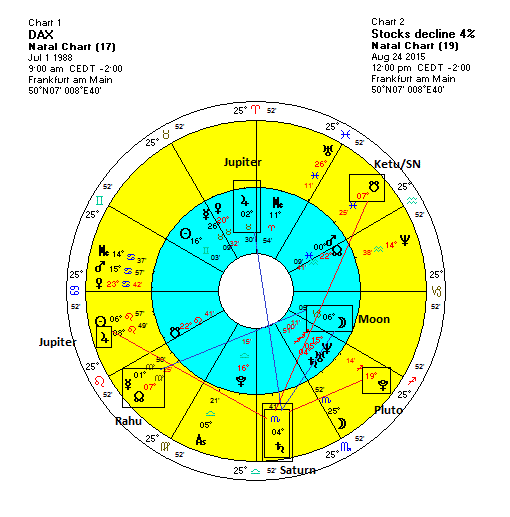
The DAX has been in a downtrend since the spring and that reflects the growing influence of Saturn. The retrograde cycle of Saturn has seen the ringed planet move into close alignments with Pluto, Jupiter and now Ketu (South Lunar Node). I have previously noted how this array of Saturn influences would likely depress global stock markets over the summer. But that is only half the picture. Given the probabilistic nature of astrology, outcomes are best seen only through confirmation from several different sources. In financial astrology, that means seeing how transit alignments may be activating the natal charts of the relevant stock exchange, the stock exchange index, commodity, or indeed individual stock.
Saturn stationed retrograde at 10 Scorpio back in March and then stationed direct in late July at 4 Scorpio. As we can see, this backwards movement of Saturn formed a tighter opposition to the natal Jupiter in the DAX chart at 2 Taurus. Saturn aspects are usually indicative of growing pessimism and the tightening of this aspect has nicely correlated with falling stock prices. Of course, prices have continued to fall into August after the Saturn-to-Jupiter aspect began to separate. Why?
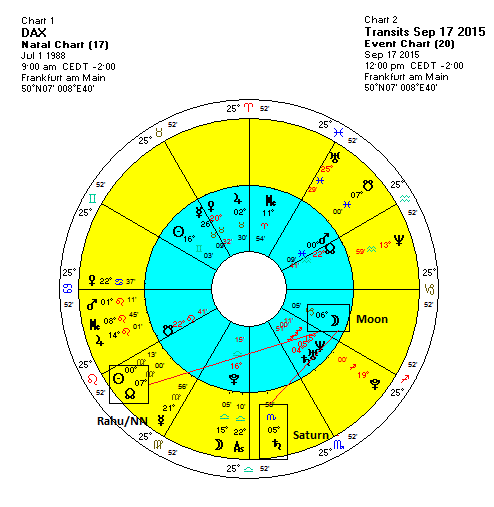
The short answer is that while Saturn is now separating from Jupiter, it is now moving towards a tighter 3rd house (sextile) aspect with the natal Moon at 6 Capricorn. The transiting nodes are also scheduled to form an exact alignment with this natal Moon in November. While this doesn't necessarily mean that stocks will decline between now and November, it does mean that declines are more likely than they would otherwise be. And we can also suggest that risk of declines are highest when both Saturn and the Nodes are simultaneously aligning to the Moon at 6 Capricorn in September.
This week could see some fallout from Monday's Venus-Mars conjunction. At the time of writing (Monday afternoon, EDT), US stocks are lower after most other global markets also suffered modest losses to start the week. We could see further downside from this conjunction although it probably won't pack that much of a punch. The week could well bring some gains as Mercury separates from the Node and aligns with Neptune.
